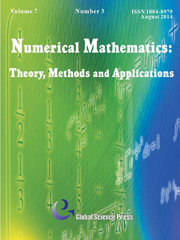No CrossRef data available.
Article contents
Augmented Lagrangian Methods for p-Harmonic Flows with the Generalized Penalization Terms and Application to Image Processing
Published online by Cambridge University Press: 28 May 2015
Abstract
In this paper, we propose a generalized penalization technique and a convex constraint minimization approach for the p-harmonic flow problem following the ideas in [Kang & March, IEEE T. Image Process., 16 (2007), 2251-2261]. We use fast algorithms to solve the subproblems, such as the dual projection methods, primal-dual methods and augmented Lagrangian methods. With a special penalization term, some special algorithms are presented. Numerical experiments are given to demonstrate the performance of the proposed methods. We successfully show that our algorithms are effective and efficient due to two reasons: the solver for subproblem is fast in essence and there is no need to solve the subproblem accurately (even 2 inner iterations of the subproblem are enough). It is also observed that better PSNR values are produced using the new algorithms.
Keywords
Information
- Type
- Research Article
- Information
- Numerical Mathematics: Theory, Methods and Applications , Volume 6 , Issue 1 , February 2013 , pp. 1 - 20
- Copyright
- Copyright © Global Science Press Limited 2013

